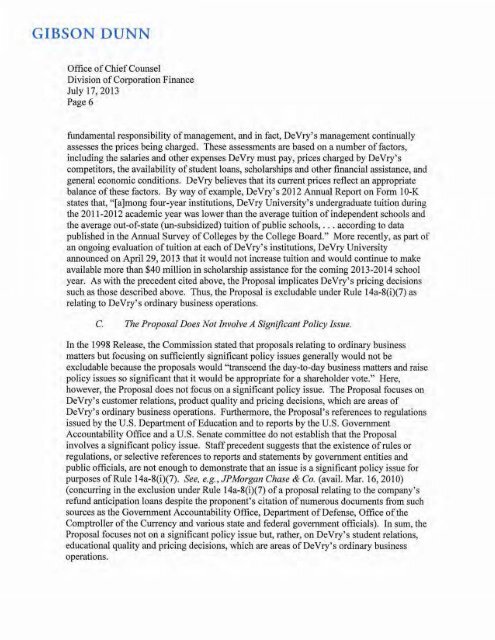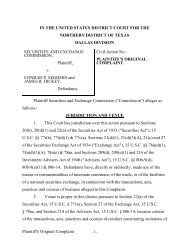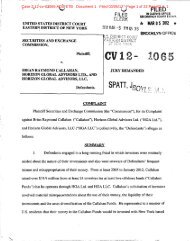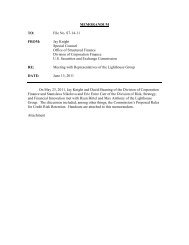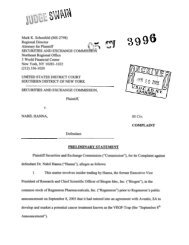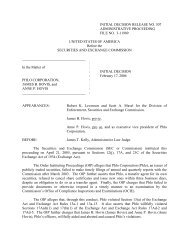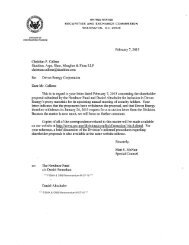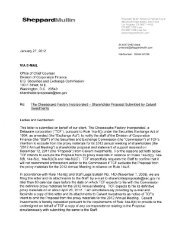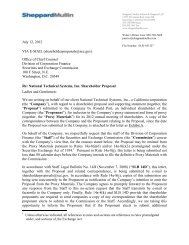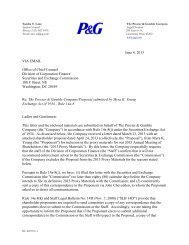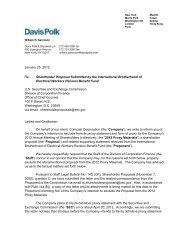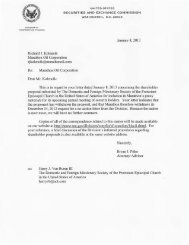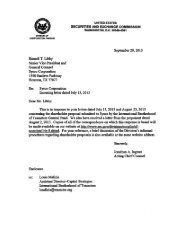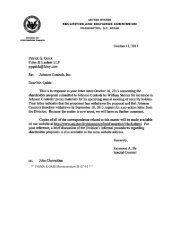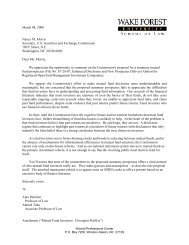GIBSON DUNN
De Vry Inc.; Rule 14a8 no-action letter - Securities and Exchange ...
De Vry Inc.; Rule 14a8 no-action letter - Securities and Exchange ...
- No tags were found...
You also want an ePaper? Increase the reach of your titles
YUMPU automatically turns print PDFs into web optimized ePapers that Google loves.
<strong>GIBSON</strong> <strong>DUNN</strong> <br />
Office of Chief Counsel<br />
Division of Corporation Finance<br />
July 17, 2013<br />
Page 6<br />
fundamental responsibility of management, and in fact, DeVry' s management continually<br />
assesses the prices being charged. These assessments are based on a number of factors,<br />
including the salaries and other expenses DeVry must pay, prices charged by DeVry's<br />
competitors, the availability of student loans, scholarships and other financial assistance, and<br />
general economic conditions . DeVry believes that its current prices reflect an appropriate<br />
balance of these factors. By way ofexample, De Vry' s 2012 Annual Report on Form 10-K<br />
states that, "[a]mong four-year institutions, DeVry University's undergraduate tuition during<br />
the 2011-2012 academic year was lower than the average tuition of independent schools and<br />
the average out-of-state (un-subsidized) tuition ofpublic schools, .. . according to data<br />
published in the Annual Survey of Colleges by the College Board." More recently, as part of<br />
an ongoing evaluation of tuition at each ofDeVry's institutions, DeVry University<br />
announced on April29, 2013 that it would not increase tuition and would continue to make<br />
available more than $40 million in scholarship assistance for the coming 2013-2014 school<br />
year. As with the precedent cited above, the Proposal implicates DeVry's pricing decisions<br />
such as those described above. Thus, the Proposal is excludable under Rule 14a-8(i)(7) as<br />
relating to DeVry's ordinary business operations.<br />
C. The Proposal Does Not Involve A Significant Policy Issue.<br />
In the 1998 Release, the Commission stated that proposals relating to ordinary business<br />
matters but focusing on sufficiently significant policy issues generally would not be<br />
excludable because the proposals would "transcend the day-to-day business matters and raise<br />
policy issues so significant that it would be appropriate for a shareholder vote." Here,<br />
however, the Proposal does not focus on a significant policy issue. The Proposal focuses on<br />
DeVry's customer relations, product quality and pricing decisions, which are areas of<br />
DeVry's ordinary business operations. Furthermore, the Proposal's references to regulations<br />
issued by the U.S. Department ofEducation and to reports by the U.S. Government<br />
Accountability Office and a U.S. Senate committee do not establish that the Proposal<br />
involves a significant policy issue. Staff precedent suggests that the existence of rules or<br />
regulations, or selective references to reports and statements by government entities and<br />
public officials, are not enough to demonstrate that an issue is a significant policy issue for<br />
purposes of Rule 14a-8(i)(7). See, e.g., JPMorgan Chase & Co. (avail. Mar. 16, 2010)<br />
(concurring in the exclusion under Rule 14a-8(i)(7) of a proposal relating to the company's<br />
refund anticipation loans despite the proponent's citation of numerous documents from such<br />
sources as the Government Accountability Office, Department of Defense, Office ofthe<br />
Comptroller ofthe Currency and various state and federal government officials). In sum, the<br />
Proposal focuses not on a significant policy issue but, rather, on DeVry's student relations,<br />
educational quality and pricing decisions, which are areas ofDeVry's ordinary business<br />
operations.


